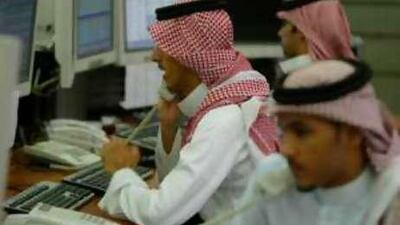Saudi Arabia's main index ended 4.01 per cent lower at 7,802.25 points in trading yesterday, its lowest close in almost a year. The negative sentiment that has swept across Gulf markets in the past few weeks, coupled with the global economic slowdown that has seen some of the world's largest banks write off billions and even collapse, hit the Tadawul hard, seeing the market slide to its lowest point since last October.
Riyad Bank was the biggest loser, falling 5.67 per cent, while Al Jazira Bank slid 2.43 per cent. As soon as the Saudi bourse opened, falls in share prices began to appear. Analysts suggested that the adoption of a new ruling, which meant that companies' stock prices would rise and fall in smaller increments, was a major factor. Banks led the early declines, with Al Rajhi Bank easing 0.25 per cent and Riyad Bank 0.30 per cent.
At this early stage, the index fell 0.05 per cent to 8,123.72 points, but as the day progressed, things worsened. At 11.30am, Saudi Arabia's bourse was down a dramatic 3.07 per cent to 7,878.54 points. Police investigations into Dubai's property market have sent property shares falling, which in turn helped drive Gulf stock markets lower last week. Banks continued to lead the decline in Saudi Arabia, with Al Rajhi Bank and Samba Financial falling 2.39 per cent and 3.55 per cent respectively. Saudi Basic Industries Corp (Sabic), Saudi's largest company by market value, could not escape the gloom and saw shares drop by 3.28 per cent.
"It's mainly due to negative sentiment. There is no direct reason why the market is going down," said Hesham Tuffaha, the head of research at Bakheet Investment Group, based in Riyadh. Analysts also suggested that the slide was in part due to the bourse's adoption of smaller increments for stock price changes, a move which it said would reflect price changes, liquidity and volumes in a more practical manner. "It will be more efficient for pricing and will boost liquidity into the market," Mr Tuffaha said.
Every Gulf market has seen shares tumble in the past few weeks. On Tuesday, the Dubai Financial Market (DFM) fell 2.58 per cent, taking its losses this year to 26.4 per cent, while the Abu Dhabi Securities Exchange (ADX) fell 2.23 per cent, leaving its loss so far this year at 10.16 per cent. Last Sunday, the DFM fell 4.6 per cent, wiping out Dh13.68 billion (US$3.7bn) of shareholders' money, while the ADX plummeted 3.7 per cent, shrinking its market capitalisation by Dh15.68bn. In the past week alone, Dh52bn was wiped off UAE stocks, taking the markets back to the levels of last October.
More than Dh65.7bn worth of capitalisation has been wiped from the markets since the beginning of this month, with most analysts and observers blaming the withdrawal of foreign investors for the downwards trend, given the continuous net sales in their positions. Dubai has suffered most because of the latest corruption investigation to hit the beleaguered housing sector - the housing mortgage firm Tamweel confirmed last week that Abdullah Nasser Abdullah, its deputy group chief executive, was arrested. He is the third Tamweel executive or former executive to be detained since April.
Analysts and brokers attributed the Dubai fall to Tamweel's subsequent plunge yesterday, which saw it lose four per cent of its value. "It is the lack of liquidity in the whole GCC which is the problem," said Zeeshan Saleem, the trading manager at MashreqBank. He also said the falls could be a result of Ramadan. Last year, the DFM reached its low midway through Ramadan - after which it recorded a bull run.
"This time we may have the same scenario. But this time last year, foreigners were looking to enter the region," Mr Saleem said. * with Reuters business@thenational.ae

